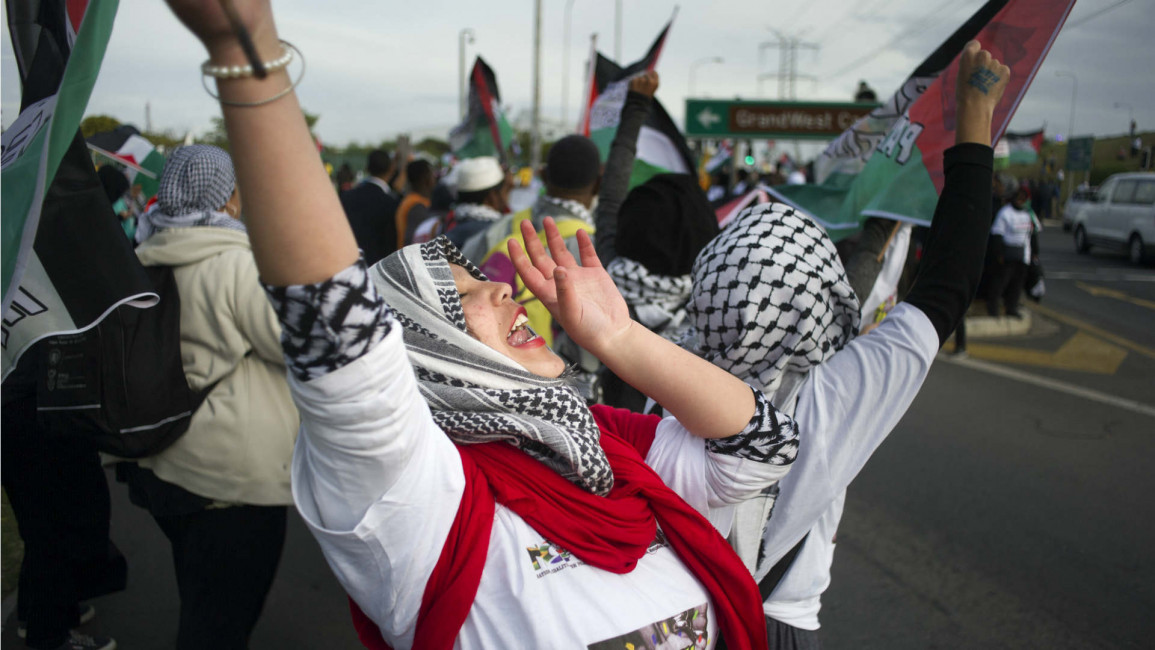Last week, I joined activists Jeremy Phillips, chairperson of the Palestine Solidarity Forum at the University of Cape Town in South Africa and Rob Gardner, the BDS Director for Students for Justice in Palestine at UCLA in the US, for an event organised by the Palestinian Campaign for the Academic and Cultural Boycott of Israel (PACBI). During the live-streamed debate, a video of which can be found below, we discussed the forms of repression we experience as a solidarity movement at the hands of our own states, official Israeli institutions, and pro-Israeli organisations.
Student organisation, despite rising hostile opposition across our nations, has strengthened on a number of campuses. BDS movements have been growing across Europe, North America, South Africa, Brazil and Chile, among many others.
In the US, over 30 student governments have voted in favour of divesting from companies complicit in the occupation of Palestine. In South Africa, national and local unions have implemented a commitment to BDS and even rallied 10,000 people to protest against the continued injustice against the Palestinian people. Here in the UK, over 30 students' unions have implemented policy in support of the call to boycott.
These continued efforts have been met with a counter-campaign, led by our own governments and pro-Israel lobby groups. A few months ago, the Conservatives -in their long tradition of supporting Apartheid and colonialism, both in Palestine and beyond- continued their onslaught on pro-Palestine groups with Head of the Department for Communities and Local Government, Sajid Javid stating that he intended to make boycott and divestment initiatives by local authorities illegal unless they are consistent with central government policy. This initiative, in the end, proved unsuccessful.
On the ground in universities, the Charity Commission has attempted to target Students' Unions who have implemented boycott policy, and in some cases Trustee Boards have overturned the democratic decisions voted through by student councils. Reasons given range from potential reputational damage to the accusation that boycott campaigns are somehow discriminatory.
The prevent strategy has also been a key tool used by the state to shut down solidarity activity. In fact, Palestine solidarity has been repeatedly highlighted in prevent training sessios as a key warning sign of so-called non-violent extremism, with even school students facing interrogation for wearing a Free Palestine badge.
Student groups and individuals, particularly people of colour and Muslims, have also been dragged through right-wing media storms. These tactics have been used around the world to delegitimise key activists in an attempt to stop any BDS organisation. The speakers on the panel agreed that, because the ideological battle of pro-Israeli groups has ultimately failed to win over civil society in general, the only option left is aggressive state-led policy to ensure the censure of debate and grassroots campaigns. This summer, the Friends of Al-Aqsa, the people behind Palestine Expo - the largest pro-Palestine event in Europe - again faced similar threats, including legal action to shut their event down.
In March, Israeli Apartheid Week [IAW], an annual event which has been running for 13 years to highlight the human rights violations committed by Israel, faced attacks both locally and nationally.
|
 |
The Conservatives - in their long tradition of supporting Apartheid and colonialism, both in Palestine and beyond - have continued their onslaught on pro-Palestine groups |
 |
|
University campuses, including UCL, Exeter and Central Lancashire threatened to shut down events with such poor excuses as 'bureaucratic mistakes', and at times giving no reason at all. The levels of attempted censorship were not like previous years and included a letter written to all universities by Jo Johnson MP, Minister of State for Universities, targeting IAW and encouraging vice-chancellors to do the same.
Despite such an intimidating force of opposition, IAW went ahead successfully across 30 campuses, as well as the Expo. Almost 250 academics publicly condemned attempts to shut down on-campus solidarity activities and thousands of students across colleges and universities continue to fight through their societies.
The message by now should be clear: we will not give up, we will not give in and we will keep fighting as long as the Occupation continues.
The reality is that the heavier the attempts of censorship and delegitimisation, the more empowered and driven activists become, because we know that our campaigns are effective and are changing the political direction. Our movements are connecting with an understanding of the intersecting nature of colonial violence.
Rob Gardner spoke of how people of colour, through shared connections with their own experiences of structural oppression, would help build support on US campuses. He underscored the parallels that are being drawn between the way companies like G4S oppress radicalised communities in prisons and detention centres, and the incarceration of Palestinians by Israel.
These connections were further strengthened by the explicit solidarity shown from Black Lives Matter. The movement's activists travelled to Palestine to connect struggles and share tactics of resistance.
The co-founder of Black Lives Matter said: "I believe the Black Lives Matter movement can benefit greatly by learning about struggles outside of the US, but particularly the Palestinian struggle. I want this trip to be an example for how Black folks and Arab communities can be in better solidarity with one another."
The picture that emerges is one in which the question of Palestine is linked to broader societal questions at home around democracy, civil liberties, and freedom of speech. While our governments, Israeli institutions, and pro-Israeli organisations fight to shut down debates, campaigns, and attempt to delegitimise activists, they also unwillingly make their weakness clear.
They are losing the political debates, they are unable to sustain their arguments, and in the face of the ongoing oppression, expropriation and displacement suffered by Palestinians at the hands of the Israeli state, students, trade unionists, activists and concerned citizens around the world are saying ENOUGH.
We are demanding that our states, our institutions, our universities and employers, stop making themselves complicit through investment and normalised relations, with this ongoing colonial injustice.
The pro-Israeli response is not focussed on demonstrating alternative points of view - perhaps because there are no alternative facts - but rather to shut down debate and limit the democratic sphere.
In doing so, they might make the immediate situation tough, but in the long run they are placing themselves in opposition to the values that millions of people fight for on a daily basis: those of freedom and justice - in Palestine and at home.
Malia Bouattia is an activist, the former President of the National Union of Students, and co-founder of the Students not Suspects/Educators not Informants Network.
Follow her on Twitter: @MaliaBouattia
Opinions expressed in this article remain those of the author and do not necessarily represent those of The New Arab, its editorial board or staff.





![President Pezeshkian has denounced Israel's attacks on Lebanon [Getty]](/sites/default/files/styles/image_684x385/public/2173482924.jpeg?h=a5f2f23a&itok=q3evVtko)



 Follow the Middle East's top stories in English at The New Arab on Google News
Follow the Middle East's top stories in English at The New Arab on Google News


